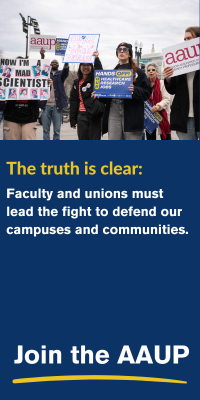- About
- Programs
- Issues
- Academic Freedom
- Political Attacks on Higher Education
- Resources on Collective Bargaining
- Shared Governance
- Campus Protests
- Faculty Compensation
- Racial Justice
- Diversity in Higher Ed
- Financial Crisis
- Privatization and OPMs
- Contingent Faculty Positions
- Tenure
- Workplace Issues
- Gender and Sexuality in Higher Ed
- Targeted Harassment
- Intellectual Property & Copyright
- Civility
- The Family and Medical Leave Act
- Pregnancy in the Academy
- Publications
- Data
- News
- Membership
- Chapters
State of the Profession: Academic Boycotts Reconsidered
This summer, the AAUP’s Committee A on Academic Freedom and Tenure approved a new Statement on Academic Boycotts. Since its release, the statement has received a great deal of support and prompted thoughtful, good-faith debate. It has also been subject to criticism that grossly misinterprets the AAUP’s position on academic boycotts. But while critics have focused on perceived threats to individual academic freedom, the AAUP’s revised position on academic boycotts is fundamentally a defense of the faculty’s ability to evaluate the risks and benefits of a particular tactic and, in doing so, to participate in governance and engage—or choose not to engage—in collective action.
The new AAUP statement finds that academic boycotts “can be considered legitimate tactical responses to conditions that are fundamentally incompatible with the mission of higher education.” The statement does not advocate for academic boycotts or support any existing boycott. Instead, it holds that “individual faculty members and students should be free to weigh, assess, and debate the specific circumstances giving rise to calls for systematic academic boycotts and to make their own choices regarding their participation in them.” The statement also emphasizes that while “faculty members’ choices to support or oppose academic boycotts . . . may be criticized and debated, faculty members and students should not face institutional or governmental censorship or discipline for participating in academic boycotts, for declining to do so, or for criticizing and debating the choices of those with whom they disagree.” The new statement concerns only boycotts of “institutions of higher education that themselves violate academic freedom or the fundamental rights upon which academic freedom depends.” It does not permit the boycott of peoples or countries.
As AAUP President Todd Wolfson and Rana Jaleel explained in an article in The Chronicle of Higher Education, Committee A reconsidered its prior policy, set forth in a 2006 report, to address a contradiction at that policy’s core. The 2006 report, while recognizing “the right of individual faculty members or groups of academics not to cooperate with other individual faculty members or academic institutions with whom or with which they disagree,” categorically opposed “noncooperation” in the form of a “systematic academic boycott” as a threat to “principles of free expression.” The attempt to draw a distinction between these two forms of collective action—“groups of academics” exercising the right “not to cooperate,” on the one hand, and a “systematic academic boycott,” on the other—is an incoherent, ideologically driven imposition on what had been a nearly hundred-year official silence on the part of the AAUP regarding academic boycotts. The new statement resolves this foundational analytical and practical tension.
Criticisms of the new statement have ignored how the prior policy resulted in serious violations of academic freedom—for example, when democratic decisions by faculty and student senates were dismissed as counter to AAUP policy categorically opposing academic boycotts. Instead, critics fear faculty refusals to write recommendation letters, the cancellation of study abroad programs, and the potential for being denied conference funding as a consequence of the decision of a department or a faculty senate to participate in a boycott, many of which occurred under the old policy. These concerns, which should be debated, are nonetheless not necessarily violations of academic freedom if they are the result of collective, democratic faculty deliberation that meets the criteria of the new statement. No individual has the unabridged right to a recommendation letter, a particular study abroad program, or conference funding. Further, under the new statement, individual faculty members remain free to engage with faculty at a boycotted institution, or even with a boycotted university itself—for example, by becoming a visiting faculty member.
Not only do such criticisms sidestep the issue of faculty governance and the collective dimensions of academic freedom, they also avoid engaging with a key rationale of the statement: to recognize that “when faculty members choose to support academic boycotts, they can legitimately seek to protect and advance the academic freedom and fundamental rights of colleagues and students who are living and working under circumstances that violate that freedom and one or more of those rights.”
Committee A reconsidered the 2006 report to be responsive to the needs and repeated requests of our membership, to expand debate about what tactics might best combat the repressions—multiple, global—of the moment, and to forestall a narrative of individualized academic freedom that enables the undermining of faculty authority in its name.
Rana Jaleel is chair of Committee A on Academic Freedom and Tenure and an associate professor at the University of California, Davis. Risa L. Lieberwitz is professor of labor and employment law at Cornell University.



